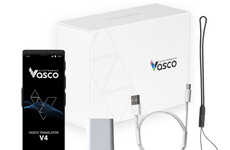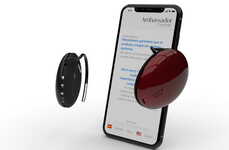
You'll Never Need to Learn Another Language Thanks to NTT Docomo
Omar Yusuf — August 26, 2011 — Tech
Put that Sino-English dictionary down, you won't need to brush up on your vocabulary before vacationing to the Far East anymore thanks to NTT Docomo's newest translation technology.
Today at the Wireless Japan 2011 Expo, mobile company NTT Docomo revealed the type of technology that sends shivers down your spines. Using voice recognition and machine-based translation, the new interpreter tech is capable of translating a telephone conversation in real time. Imagine trying to reserve a hotel room in Kyoto -- you'd almost certainly have to begin with the "Do you speak English" rigmarole. Instead, simply download Docomo's app and every word you utter will come through in Japanese. The only indication that you're not from Nippon might be the strangely robotic voice that replaces yours.
This technology has the ability to turn every boardroom, cafe or lounge into the U.N. general assembly, where everyone has their own personal translator. Amazing!
Today at the Wireless Japan 2011 Expo, mobile company NTT Docomo revealed the type of technology that sends shivers down your spines. Using voice recognition and machine-based translation, the new interpreter tech is capable of translating a telephone conversation in real time. Imagine trying to reserve a hotel room in Kyoto -- you'd almost certainly have to begin with the "Do you speak English" rigmarole. Instead, simply download Docomo's app and every word you utter will come through in Japanese. The only indication that you're not from Nippon might be the strangely robotic voice that replaces yours.
This technology has the ability to turn every boardroom, cafe or lounge into the U.N. general assembly, where everyone has their own personal translator. Amazing!
Trend Themes
1. Real-time Translation - The advancement of real-time translation technology provides opportunities to break down language barriers and enable seamless communication across cultures.
2. Voice Recognition - Voice recognition technology opens up possibilities for hands-free communication and improved accessibility for individuals with speech impairments.
3. Machine-based Translation - The development of machine-based translation systems allows for more efficient and accurate language translation, reducing the need for human translators.
Industry Implications
1. Mobile Technology - The integration of real-time translation capabilities in mobile devices presents opportunities for enhanced global communication and improved user experience.
2. Hospitality - The implementation of real-time translation technology in the hospitality industry can facilitate smoother customer interactions and provide a more personalized and inclusive experience for international guests.
3. Speech Recognition - The deployment of voice recognition technology in various industries, such as healthcare and customer service, can enhance communication efficiency and streamline processes.
1.3
Score
Popularity
Activity
Freshness























